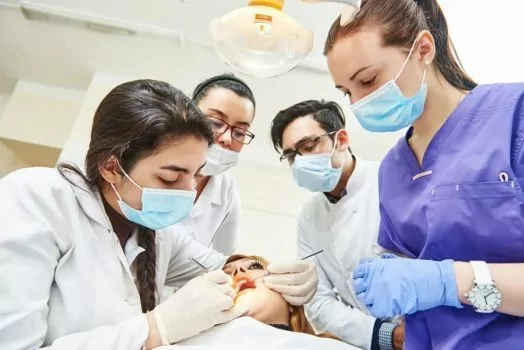
If you're planning a career in healthcare, dentistry might be one of the professions on your radar. Dentistry is a specialized branch of medicine focused on the diagnosis, prevention, and treatment of diseases affecting the teeth, gums, and overall oral cavity. Dentists are trained professionals who provide vital oral healthcare services to individuals of all age groups—from young children to senior citizens.
But how exactly do you become a dentist in India? What advantages does this profession offer, and what paths can you pursue after earning a dental degree? In this article, we’ll walk you through the key details of the Bachelor of Dental Surgery (BDS) program—India’s only recognized professional dental course.
What is BDS?
BDS stands for Bachelor of Dental Surgery, a 5-year undergraduate program that prepares students for careers as dental surgeons. The course includes 4 years of academic and clinical study, followed by a compulsory 1-year rotating internship. The program is governed by the Dental Council of India, which ensures standards in dental education and professional practice.
During the BDS course, students learn about various branches of dental science, including dental anatomy, oral histology, pathology, medicine, surgery, prosthodontics, periodontics, orthodontics, endodontics, pediatric dentistry, community dentistry, and more. The curriculum includes theoretical learning, practical training, clinical exposure, seminars, and research projects.
Eligibility Criteria for BDS
To be eligible for admission to a BDS program in India, aspirants must have completed 10 2 (or equivalent) with Physics, Chemistry, Biology/Biotechnology, and English as compulsory subjects. A minimum of 85% aggregate marks in these subjects is generally required from a recognized educational board.
Additionally, all applicants must qualify the NEET (National Eligibility cum Entrance Test)—the only entrance exam for BDS admission in India. Conducted by the National Testing Agency (NTA), NEET is typically held once a year and includes 180 multiple-choice questions from Physics, Chemistry, and Biology. The exam duration is 3 hours, with a total of 720 marks.
Based on NEET scores and ranks, candidates participate in counseling sessions conducted at the national, state, or institutional level, depending on the type of college (government or private) and seat category (All India Quota or State Quota).
Why Choose BDS? Benefits of Pursuing a Dental Degree
Choosing BDS opens the door to numerous opportunities in both public and private sectors. Here are some notable benefits of this career path:
- Wider Job Scope
A BDS degree provides more extensive job opportunities than a diploma or associate degree. Graduates can work in hospitals, clinics, educational institutions, NGOs, the armed forces, public health departments, and more. They can also teach or conduct research in dental institutions. - Human-Centered Profession
Unlike some professions that are increasingly automated, dentistry demands manual skill, patient interaction, and clinical judgment—qualities machines cannot replicate. As such, dentists remain irreplaceable by AI or robotics. - Attractive Salary Potential
Dentists are among the better-paid professionals in India and abroad. In addition to salaried roles, dentists can boost their income through private practice or part-time consulting. - Higher Studies and Specialization
After BDS, students can pursue advanced education such as MDS (Master of Dental Surgery) in areas like Oral Surgery, Orthodontics, Periodontology, and more. Other options include PhDs, diplomas, or certifications in allied fields—leading to higher positions and better pay.
Career Prospects After BDS
A BDS degree opens up diverse career paths across multiple sectors. Some common roles include general dentist, dental surgeon, specialist, consultant, educator, researcher, or public health expert. Graduates may also start their own clinics or join established practices.
Key employment sectors include:
- Government Sector:
BDS graduates can become dental officers in government hospitals, public health centers, railways, municipal bodies, and the defence forces (Army, Navy, Air Force). These jobs offer job security and additional benefits. - Private Sector:
Dentists are in high demand at private hospitals, multispecialty clinics, corporate dental chains, and healthcare startups. Opportunities also exist internationally for skilled professionals. - Academic and Research Fields:
Dental graduates can work as lecturers, researchers, or administrators in dental colleges. Those interested in academia often pursue MDS or PhD programs to enhance their qualifications. - NGOs and Outreach Work:
Many social organizations employ dentists to provide oral healthcare in underserved communities. This work includes participating in health camps, awareness campaigns, and outreach initiatives.
Conclusion
The Bachelor of Dental Surgery (BDS) program is a solid foundation for a fulfilling and impactful career in healthcare. It offers promising prospects in public service, private practice, academia, and research. However, success in dentistry requires dedication, continuous learning, and a genuine commitment to improving oral health. If you are passionate about helping others and want to build a meaningful career in medicine, BDS is an excellent choice.
Frequently Asked Questions(FAQs)
- How many marks are required in NEET for BDS?
While cut-offs vary, a score of 450 or above is generally considered sufficient for admission into reputable dental colleges.
- What is the career scope after BDS?
BDS offers a wide range of career opportunities in clinical practice, teaching, research, public health, and higher education, with strong earning potential.
- Which specialization is considered best in BDS?
It depends on individual interests, but many dentists favor conservative dentistry, as it involves minimal surgery and focuses on preserving natural teeth.
- How long does the BDS program take in India?
The BDS program is a 5-year course, including 4 years of academic study and 1 year of compulsory internship.
- Which dental specialization earns the most in India?
Pediatric Dentistry (Pedodontics) is often cited as one of the highest-paying dental specialties, with an average monthly salary around ₹35,000, and potential for more with experience.